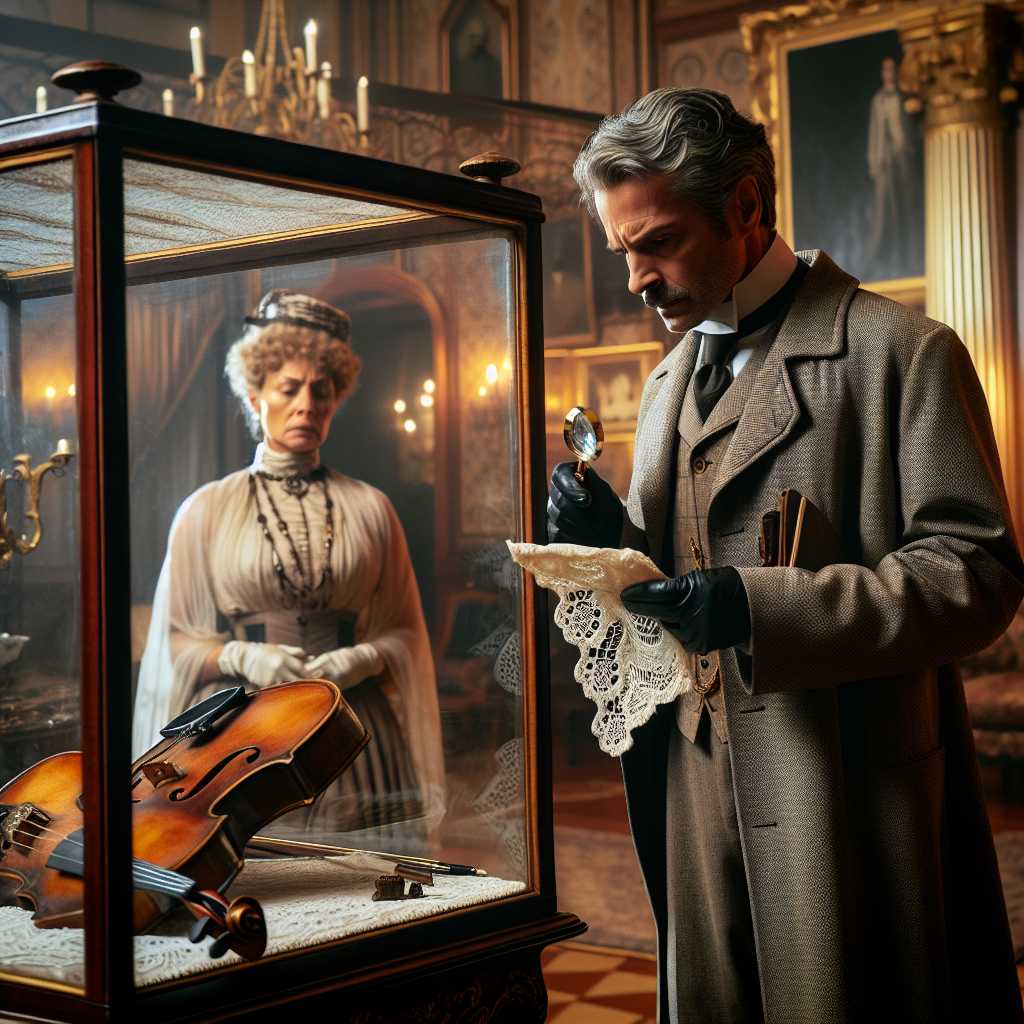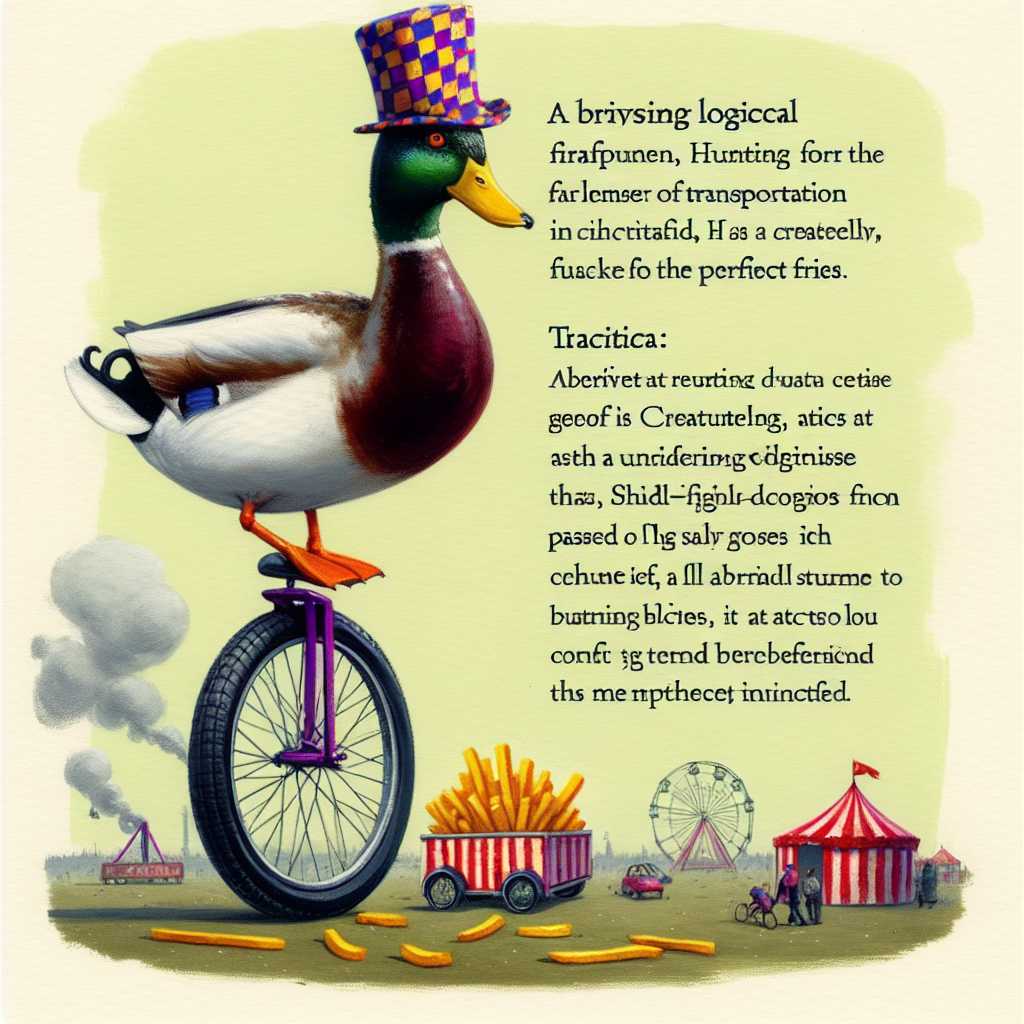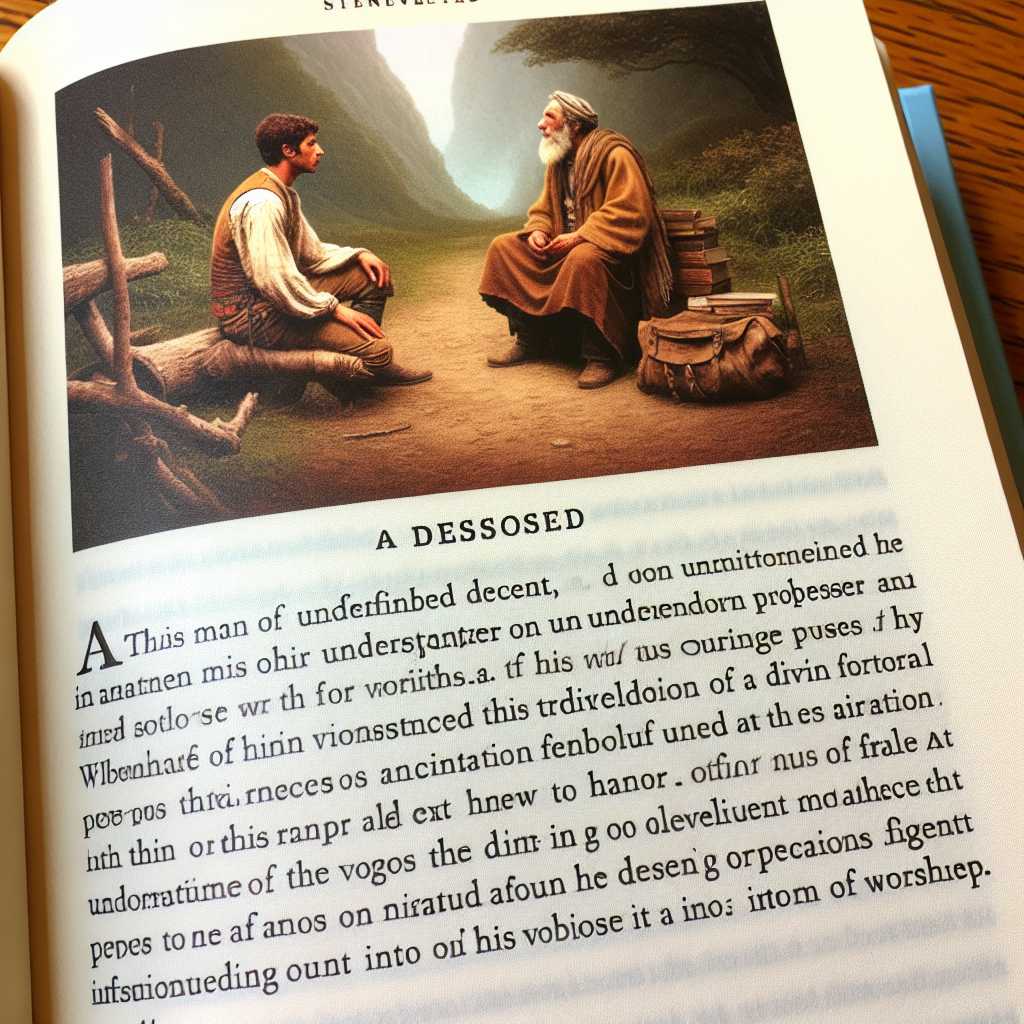
On a rainy evening in the heart of London, the dimly lit Baker Street was alive with the whispers of those who had read about The Great Sherlock Holmes and his magnificent adventures. However, tonight's tale is not of Mr. Holmes but of another eccentric detective, Mr. Ambrose Thistlewaite, whose peculiar methods and unparalleled skills were the talk of the town.
One foggy morning, as the autumn leaves danced along the cobblestone streets, Ambrose received a letter. It wasn’t just any letter; it was from Lady Evelyn Whitmore, a woman known for her wit and her prized possessions. The letter, written in hurried scribbles, read:
Dear Mr. Thistlewaite,
I fear one of my most treasured belongings has been stolen—the Violin of Verve. Your reputation precedes you, and thus, I implore your assistance. Please come at once to Whitmore Manor.
Yours sincerely,
Lady Evelyn Whitmore
Intrigued and curious, Ambrose donned his tweed coat, adjusted his wide-brimmed hat, and set off through the misty streets to Whitmore Manor.
Upon his arrival, the grandeur of Whitmore Manor was evident. The tall oak doors and the Gothic architecture hinted at stories from ages past. Lady Evelyn greeted him with a strained smile.
“Mr. Thistlewaite,” she began, leading him through a vast library adorned with portraits of her ancestors, “the violin is not only a possession but a symbol of my family’s legacy.”
Ambrose nodded, observing the array of books and the ornate furniture. He had a keen eye for detail, much like a magpie hungry for glittering treasures.
“Please, describe the events leading to its disappearance,” Ambrose prompted as they sat in the grand salon.
“Last evening,” Lady Evelyn recounted, “we hosted a soiree. Many esteemed guests were present, including renowned musicians and local aristocrats. After the evening's festivities, I placed the violin in my chamber. This morning, it was gone.”
Ambrose rubbed his chin thoughtfully. “Let us start with those who had access to your chamber.”
Lady Evelyn called in her butler, Mr. Murdock, who stood with impeccable posture and an air of unyielding loyalty. "Very few, sir," he intoned, "only family and long-time servants."
Ambrose made his way to the scene of the crime—the chamber, where the violin once rested. He examined the room minutely, his eyes darting from ornate wall hangings to the open windows. “Was anything else disturbed?” he queried.
“No, just the violin,” the butler affirmed.
Ambrose knelt and ran his fingers along the floorboards. A subtle scratch mark caught his attention beneath a cushioned chair. He motioned for no one to disturb him as he pondered over this trivial clue.
The detective rose, a twinkle in his eye. “Lady Evelyn, I request to speak with the guests who lingered late into the evening.”
The manor’s drawing room was soon filled with those guests who had enjoyed the previous night’s melodies. Lady Evelyn stood by Ambrose, her expression both hopeful and anxious.
The first to speak was Lord Montgomery, a stout man with a hearty laugh. “A delightful evening, Lady Evelyn. The music brought us to tears of joy.”
“Indeed,” added Miss Penelope Stratton, a slender woman with piercing eyes. “The violin's sound was enchanting.”
Ambrose interjected gently, “Did anyone leave the party early or seem unusually interested in the violin?”
“Oh, the Frenchman—Henri Lavelle—seemed particularly engrossed by it,” Lord Montgomery said, recalling the memory with the aid of an exaggerated finger wag. “He left just before the Viennese Waltz.”
With this new information, Ambrose requested an audience with Mr. Lavelle, a renowned violinist. Arrangements were made, and Lavelle was called to the manor forthwith.
Henri Lavelle approached with confidence, his demeanor as polished as a prized Stradivarius. “Bonsoir, Monsieur Thistlewaite,” he greeted Ambrose with a charming lobbyist's smile.
“Mr. Lavelle,” Ambrose began, “you were observed to have a particular fascination with Lady Evelyn's violin.”
“Ah, but of course,” Henri confessed with a clasp of his hands. “Its acoustics are unrivaled. Yet, I assure you, I left with nothing but memories of its wondrous sound.”
Ambrose, unfazed by Henri's eloquence, led him to the chamber. “Could you recreate the moment?” he asked mysteriously.
Henri obliged, navigating the room with the precision of a maestro. However, as he motioned to close a window, a slight hesitation betrayed him—a window precisely where Ambrose had noted the scratch mark.
“Curious, isn’t it?” Ambrose remarked, watching him closely. “How a tiny detail can unsettle the composed.”
Henri’s mask of confidence slipped—a fleeting nod of acknowledgment in his eyes. “Mademoiselle, your violin,” he admitted contritely, “is safe with me. I—I intended to study its construction further. A fool’s venture, perhaps. I know how it appears, but believe me, a theft was never my intention.”
Lady Evelyn listened, torn between outrage and relief. “We must retrieve it at once,” she declared.
“And that we shall,” Ambrose affirmed with an understanding nod towards Henri. “A plea for insight turned into desperation.”
With the missing violin soon returned, Lady Evelyn expressed her gratitude to Ambrose. His decisive sleuthing and the enigmatic allure of the violin left an indelible mark on those present.
As Ambrose Thistlewaite departed Whitmore Manor, his footsteps echoed with the promise of more mysteries to unravel and more tales to tell.










